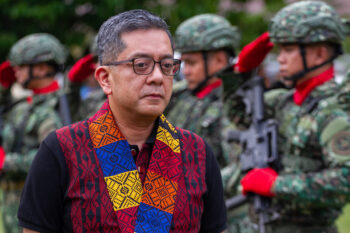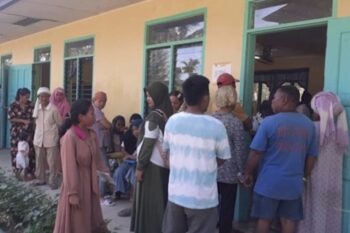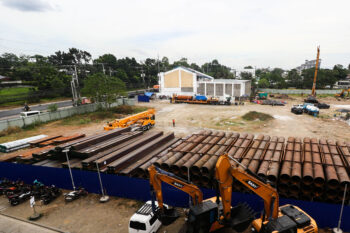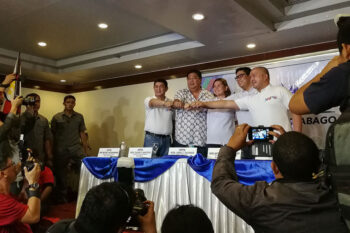GENERAL SANTOS CITY, March 13, 2015 – We are wondering: Is President Benigno Simeon C. Aquino III losing his equanimity? Or, should the proper question be “has he lost” rather than “is he losing”? If he is or he has, it is bad for the country. Consequently, he will lose his credibility and dignity as President. And, the irreparable damage is the loss of dignity of the Office of the President.
Last Monday, March 9, he invited leaders of evangelical groups to the Palace to conduct a prayer meeting. He did not invite the Iglesia ni Kristo, the El Shaddai, and the Catholic Bishops. That spoke a lot. Had he cut off his bridge with the Catholic Church?
The prayer meeting was followed by an open forum. One question asked by Pastor Ed de Guzman: What exactly happened in Mamasapano on January 25? As Rappler reported, his answer was a 30-minute narrative — the transcript showing 4,758 words) — that could be summed up in four words: “Binola ako ni Napeñas” (Napeñas fooled me) – referring to Police Director Getulio Napeñas, Jr., the commander of the PNP Special Action Force, who was suspended following the Mamasapano debacle.
He was severely criticized by both his critics and allies. On the following day, during the 29th anniversary celebration of the Presidential Security Group, he hit back at his critics essentially repeating the same narrative and calling them “KSP” or “Kulang sa Pansin” (attention seekers). (Philippine Daily Inquirer, March 11, 2015: Aquino draws heavy fire — Foes, allies’ flak triggered by President blaming Napeñas)
Whether he spoke with notes or by memory, the narrative in Pilipino and Taglish was extemporaneous, not prepared – rambling and repetitious. From the transcript that the Office of the President had distributed, different media outlets picked the “interesting” revelations, slanting their reports differently.
Rappler, besides publishing the entire narrative, headlined, “Aquino: Napeñas ‘tricked me’ on Mamasapano”, with the lead, “In a blistering attack against dismissed Special Action Forces commander Getulio Napeñas, the President calls him an unprofessional cop caught ‘in a lot of wishful thinking’ who ‘acted alone’.”
In order, it presented Aquino’s account of Napeñas’ faults: (1) Napeñas did not follow Aquino’s orders; (2) Napeñas did not plan the operation well; (3) Napeñas gave Aquino wrong information; (4) Napeñas did not abort the operation when he should have; (5) Napeñas acted alone.
The Philippine Star: “Noy: I was fooled on Exodus”, with lead, “They defied his orders and fooled him, and it was ‘painful.’/ An emotional President Aquino bared yesterday that relieved Special Action Force commander Director Getulio Napeñas and suspended Philippine National Police chief Director General Alan Purisima deceived him about the SAF’s operation to get two terrorists in Mamasapano, Maguindanao on Jan. 25.
Then it published another story, with Communications Secretary Herminion Coloma Jr., as the source, who taught readers how to read his boss’ narrative – headlined,“Palace: PNoy’s statement on Mamasapano not meant to assign blame”, with lead,”It was not President Benigno Aquino III’s objective to assign blame when he revealed yesterday that he was deceived about the deadly Special Action Force (SAF) operation in Mamasapano, Maguindanao, Malacañang said Tuesday.”
Philippine Daily Inquirer: “Aquino: Napeñas should have aborted Mamasapano operation, Says ‘Oplan Exodus’ became ‘Mission Impossible’”, with lead, “President Aquino on Monday again defended himself against public outrage over his refusal to take responsibility for the Mamasapano clash, saying the police counterterrorism operation would have had a different outcome had the ground commander followed his instructions to coordinate with the military.”
In pointing an accusing finger to Napeñas, the proverbial three fingers were pointing back to him. His post-operation analysis, masterfully done as by military strategic planner, pointed all the blame to Napeñas — with the afterthought, “Had I known, I would not have allowed the operation” – sounding like that. And, the main cause of the bloody ending of what appeared as a well-planned operation was Napeñas’ failure to coordinate properly with the military.
Who must be blamed for the lack of proper coordination?
PNP-AFP coordination must be between the PNP director general and the AFP chief of staff. Orders to coordinate must follow the chain of command from top to bottom. In the case of “Operation Exodus”, the order of military support must have come from the AFP chief of staff to the Western Mindanao Command to the 6th Infantry Division in Camp Siongco in Datu Odin Sinsuat, Maguindanao. Napeñas was not the PNP director general; he could not coordinate with the AFP chief of staff.
President Aquino III, as commander-in-chief, knew that. And, he knew there was a breach in the PNP chain of command – for he had created it. At the time, PNP Director General Alan Purisima was under suspension. Yet, he allowed Purisima to be directly involved in “Operation Exodus” with Napeñas getting orders from him – the President negating the Ombudsman’s suspension order and ignoring PNP Acting Director General Leonardo Espina.
Purisima was already under suspension when he, accompanied by Napeñas, briefed the President for the last time on “Operation Exodus” on January 9, 2015. Right then, he should have told Purisima to keep out – calling Espina to be at the briefing. Then, he could have given his orders to coordinate with the AFP to Espina, not to Napeñas.
Purisima ordered (he called it “advice”) Napeñas not to reveal to Espina the operation plan and he would take care of the coordination with the AFP chief of staff. Espina knew of the operation only after it had been launched on January 25. How could there be proper coordination with support from the AFP and with the MILF through the AHJAG (Ad Hoc Joint Action Group of the Ceasefire Mechanism)?
Did Napeñas fool (binola) the President about the operation on January 25?
Aquino said that in the initial reports on January 25, he was given the impression that the operation was going on as planned only to be shocked when informed about the slaughter of the 44 commandoes. He accused Napeñas of fooling him, of lying. But he himself said he was not directly in touch with Napeñas but with Purisima. Clearly, Purisima was monitoring the operation; Napeñas reported to him; and he relayed the reports to the President. Purisima could have hidden the truth until he could no longer do it.
The only way to determine who fooled the President – Purisima or Napeñas – is to access their SMS or text exchanges from their cellphones or from the service provider. Napeñas has given his cellphone to the PNP Board of Inquiry but those of the President and of Purisima are inaccessible.
What was the gravest blunder?
The President accused Napeñas of having no sense of urgency, of being unprofessional. What he saw in the mirror was his own image.
After the January 9 briefing, he presumed his orders would be followed; the operations would go smoothly as planned according to the briefing. Was that professionalism?
He accused Napeñas of “acting alone”. What can the poor guy do? By allowing Purisima to call the shots, Aquino cut Napeñas from the PNP chain of command – taking orders from Purisima, who was also “acting alone” because his suspension had cut him from the chain of command. Was the President fair to Napeñas?
On January 25, did the President give “Operation Exodus” any sense of urgency? At 5:20 a.m., Purisima sent the first text message about the operation. He got it at around 7:30 because his cellphone was off. That day he went to Zamboanga City to meet the victims of the bombing on January 24. Was that visit more urgent than the “Operation Exodus”?
He should have ordered the setting up of a “war room” where he and the top PNP and AFP generals could follow the operation from the mobilization on January 22 to the launching on January 25. He himself said that the commandos would be pitted against about 3,000 Moro rebels, showing the odds could not be taken for granted.
Right on January 22, he could have known about the coordination. Had there been none, he could have ordered the operation aborted. Had there been, he could have made sure the support units were in place, ready. He said, “Had I known!” Did he really mean it?
Midnight of January 24 was very critical. The 84th SAF had difficulty in crossing the river. After two hours, only 13 or a third of the force had crossed. Had he and the top generals been monitoring the operation, they could have decided with Napeñas at the Shariff Aguak command post what to do – whether to abort the operation or not?.
He said Napeñas panicked and made erratic decisions. He was alone; Purisima was of no help at such critical moment. Support from the commander-in-chief and the chain of command could have steadied him.
The gravest blunder was that of the President.
By entrusting the operation to Purisima, he also cut himself as commander-in-chief from the chain of command. So, he complained of nobody giving him the correct report. Even if he did get the correct report what could he have done? The lack of proper coordination proved fatal.
In his narrative, Aquino was like a man struggling to get out of the grave he himself had dug. He talked like a politician in a political tit-for-tat, not in the language of a statesman, the paramount leader and president of his country.
Former President Fidel V. Ramos (Philippine Daily Inquirer, March 12, 2015: Ramos: Aquino does not sound presidential) described Aquino’s speech, his 30-minute narrative, “as less than the ‘high standard of behavior’ required of the Commander in Chief”.
Aquino’s advisers have “failed in their mission to keep the President of our country up there, instead of being the target now of all kinds of criticism high and low”, not only in the President’s meeting with evangelical leaders last Monday but also in other previous instances”.
He was “so disappointed with the language used” by Aquino. “If that (language) were used in a meeting of group of international leaders or even just ordinary foreigners visiting our country, the impact, including the message given, would have been so negative for our country.”
(Author’s Note: Mind da News, the alternate of COMMENT, is a comment on current news. The author may be contacted at patponcediaz@yahoo.com.)







